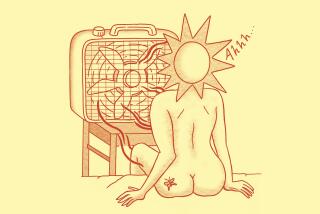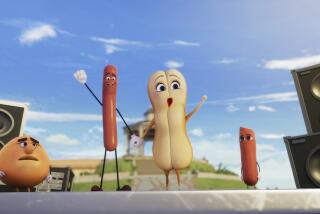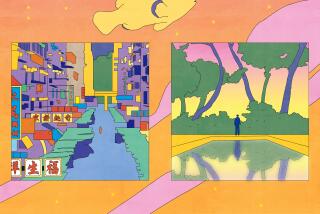Review: ‘Strange Planet’ is a sweet, cheerful examination of humanity through an alien lens
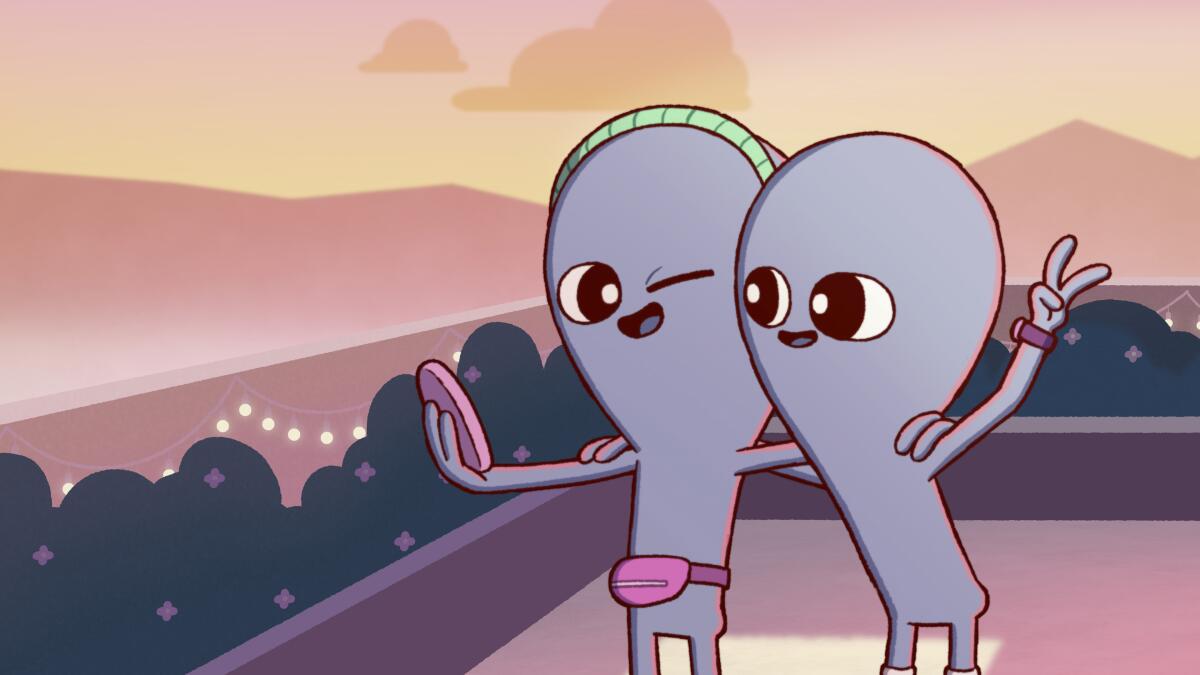
“Strange Planet,” the popular web comic by Nathan W. Pyle, has been expanded, by Pyle and Dan Harmon, into a television series premiering Wednesday on Apple TV+. Bright, sweet and cheerful, if unusually concerned with mortality, it is, as satire, highly affectionate — keen to human frailty but understanding, hopeful, more engaged with our possibilities than our limitations.
The series centers on a race of vaguely lightbulb-shaped, barely distinguishable blue beings who, for all intents and purposes, are human beings on a planet that, for all intents and purposes, is Earth, its two moons notwithstanding. The comic is a witty commentary on a variety of human desires, habits, behaviors, strategies and pursuits, observing daily life through the filter of an “alien” language, in which the heart is a “blood pump,” parents are “lifegivers,” years are “rotations,” alcohol is “mild poison,” coffee is “jitter liquid” and a high school dance is an “adolescent limbshake.” (“Throw your hands in the air like you just don’t care” becomes “Wave your hands in the air without regard for what others are thinking.”) The formality of their speech makes it sound “scientific” in a way that recalls “SNL’s” Coneheads, minus the blank effect; the blue “beings,” as they’re called, are our temperamental doubles. (Unlike the beings, animals — “creatures,” generically, while pets are “vibrating creatures” — look just like their Earthly counterparts, except for a third eye, which is more disturbing than the fact that the beings have no pants on.)
Where the comic is highly conceptual, with discrete gags typically delivered in the space of four panels, the series requires something meatier, with more action, identifiable characters and narrative and emotional arcs, which come in longer and shorter varieties. Each of its 10 episodes explores different settings and themes — air travel, sports, fandom, friendship, fitness, quarter-life crisis, children separating from parents, wild versus domesticated animals, love. (Most of it could be translated easily into live-action situation comedy.) A few characters recur throughout, others for a particular episode, but pretty much the whole cast is back onstage for the finale.
Apart from the members of an emo-ish rock band, the Four Sensations (identitifed Lonely, Fragile, Hung Up on Their Ex and Drum), none of the beings has a name, so I won’t get too particular about them or, indeed, be able to tell you which actor plays what role. (Danny Pudi, Lori Tan Chinn, Hannah Einbinder, Demi Adejuyigbe and Tunde Adebimpe are the main performers.) Characters are not overtly gendered — their pronouns are universally “they” and “them” — but in most cases, gender may be inferred. They’ve been given minor individual characteristics — a hat, a vest, tattoos, glasses, jewelry, a beauty mark, freckles, wrinkled outlines for the oldsters — to keep things dramatically clear. (A flight attendant — or “comfort supervisor” is given a new scarf to reflect a promotion. “Obviously the scarf will not change in function,” says their boss. “What is the scarf’s function?” they ask. “Well, unless your neck is cold — none.”)
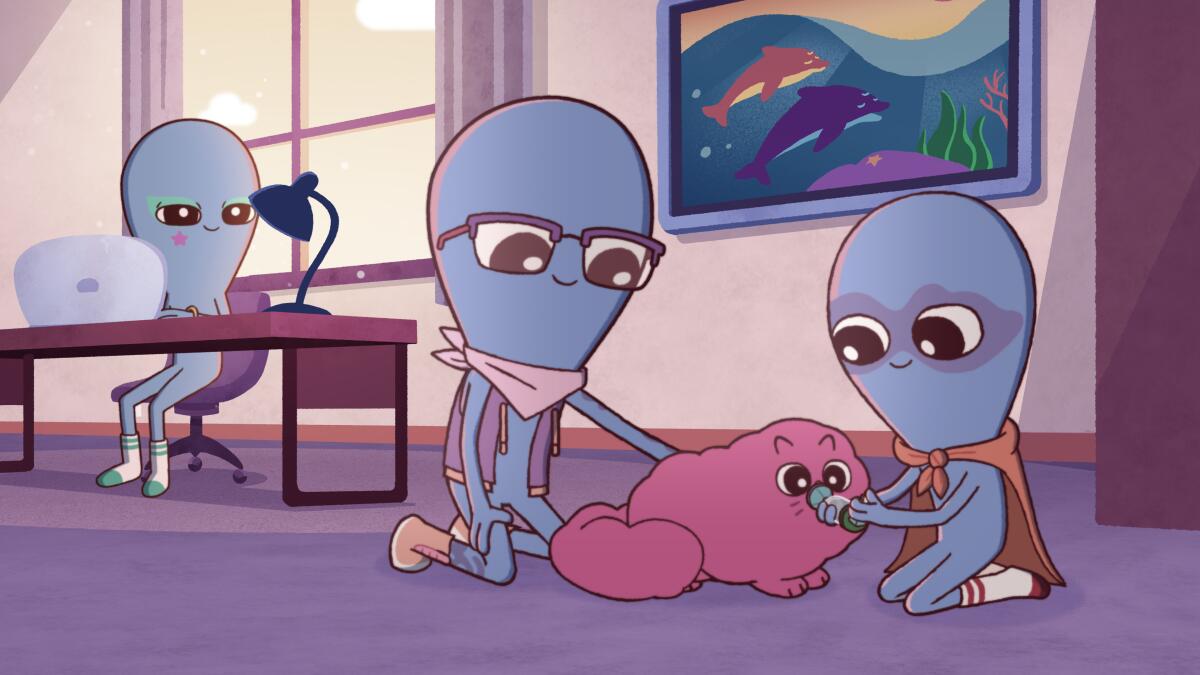
Much of the action revolves around Careful Now, a restaurant perched preciously on stilts above a fog-filled abyss (no one knows exactly what’s beneath the fog). Here we meet a manager, as close as the series has to a main character; an owner; an engineer whose job it is to keep the restaurant from falling into the “crevasse”; and a customer (identified only as Table 16), who has a crush on the manager. (Their tentative courtship is portrayed in one episode as a riff on Richard Linklater’s “Before Sunrise.”)
Harmon, co-creator of “Rick and Morty,” might not be the first person one would associate with such a project, but “Community,” with which he had an on-again, off-again, on-again relationship, was for all its ironic humor and snark a show about the necessity of other people — much like “Strange Planet” — and though it mocked the “what have we learned” speeches that often ended a television episode was also sincere in its sentiments and fundamentally good-hearted; that’s why it lasted five seasons on broadcast television (and survived for a sixth on Yahoo! Screen, which did not itself survive, with the long-bruited movie scheduled to begin production in 2024). The same is true of the cartoon “Harmonquest,” based on the “Dungeons & Dragons” segment of his self-lacerating podcast “Harmontown,” a group improvisation toward a shared goal.
In a way, “Strange Planet,” whose source material has been collected into a couple of volumes, is a sort of animated children’s book for adults, replete with explicitly stated morals and lessons; we are, by necessity, lifelong lesson-learners, so the series proves useful as well as entertaining. The directness of the language allows Pyle and the writers to nakedly address issues that in an ordinary comedy — not to say, ordinary conversation — would be cloaked in ambiguity and equivocation. (Blunt honesty, because it is unusual, is a reliable comic tool.) Broadly stated, the point of the show is to love the world and its beings and creatures, and to be brave and bold, because life is fleeting and all things perish — the blue being’s favored word for die.
“The challenging moments in your life are just that … moments,” an older character tells a younger. “The bad moments will pass, even the good moments will pass, but everything you do and experience, that’s what our existence is all about.”
“I guess all beings look for permanence when the lack of permanence is what makes life so interesting,” says another.
And again: “The purpose of life is to give life purpose.”
So wave your hands in the air without regard for what others are thinking. Whatever your planet, it’s a good way to go.
More to Read
The complete guide to home viewing
Get Screen Gab for everything about the TV shows and streaming movies everyone’s talking about.
You may occasionally receive promotional content from the Los Angeles Times.
